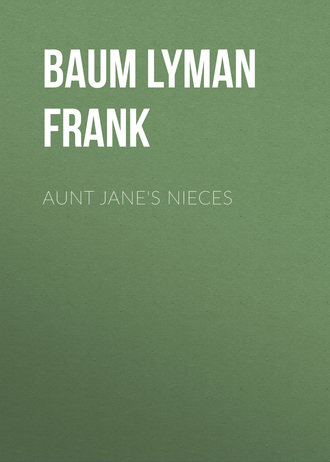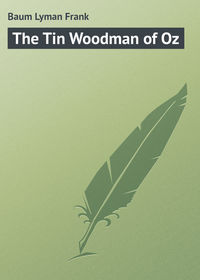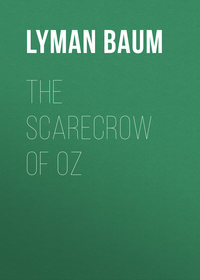 полная версия
полная версияAunt Jane's Nieces
So harmony was restored, and Mr. Watson wondered more and more at this strange perversion of the old woman's character. Heretofore any opposition had aroused in her intense rage and a fierce antagonism, but now she seemed delighted to have Patsy fly at her, and excused the girl's temper instead of resenting it.
But Patsy was a little ashamed of herself this morning, realizing perhaps that Aunt Jane had been trying to vex her, just to enjoy her indignant speeches; and she also realized the fact that her aunt was old and suffering, and not wholly responsible for her aggravating and somewhat malicious observations. So she firmly resolved not to be so readily entrapped again, and was so bright and cheery during the next hour that Aunt Jane smiled more than once, and at one time actually laughed at her niece's witty repartee.
After that it became the daily program for Patsy to spend her mornings in Aunt Jane's little garden, and although they sometimes clashed, and, as Phibbs told Beth, "had dreadful fights," they both enjoyed these hours very much.
The two girls became rather uneasy during the days their cousin spent in the society of Aunt Jane. Even the dreadful accounts they received from Phibbs failed wholly to reassure them, and Louise redoubled her solicitious attentions to her aunt in order to offset the influence Patricia seemed to be gaining over her.
Louise had also become, by this time, the managing housekeeper of the establishment, and it was certain that Aunt Jane looked upon her eldest and most competent niece with much favor.
Beth, with all her friends to sing her praises, seemed to make less headway with her aunt than either of the others, and gradually she sank into a state of real despondency.
"I've done the best I could," she wrote her mother, "but I'm not as clever as Louise nor as amusing as Patricia; so Aunt Jane pays little attention to me. She's a dreadful old woman, and I can't bring myself to appear to like her. That probably accounts for my failure; but I may as well stay on here until something happens."
In a fortnight more Patricia abandoned her chair and took to crutches, on which she hobbled everywhere as actively as the others walked. She affected her cousins' society more, from this time, and Aunt Jane's society less, for she had come to be fond of the two girls who had nursed her so tenderly, and it was natural that a young girl would prefer to be with those of her own age rather than a crabbed old woman like Aunt Jane.
Kenneth also now became Patsy's faithful companion, for the boy had lost his former bashfulness and fear of girls, and had grown to feel at ease even in the society of Beth and Louise. The four had many excursions and picnics into the country together; but Kenneth and Patsy were recognized as especial chums, and the other girls did not interfere in their friendship except to tease them, occasionally, in a good natured way.
The boy's old acquaintances could hardly recognize him as the same person they had known before Patricia's adventure on the plank. His fits of gloomy abstraction and violent bursts of temper had alike vanished, or only prevailed at brief intervals. Nor was he longer rude and unmannerly to those with whom he came in contact. Awkward he still was, and lacking in many graces that education and good society can alone confer; but he was trying hard to be, as he confided to old Uncle John, "like other people," and succeeded in adapting himself very well to his new circumstances.
Although he had no teacher, as yet, he had begun to understand color a little, and succeeded in finishing one or two water-color sketches which Patsy, who knew nothing at all of such things, pronounced "wonderfully fine." Of course the boy blushed with pleasure and was encouraged to still greater effort.
The girl was also responsible for Kenneth's sudden advancement in the household at Elmhurst.
One day she said calmly to Aunt Jane:
"I've invited Kenneth to dinner this evening."
The woman flew angry in an instant.
"Who gave you such authority?" she demanded.
"No one. I just took it," said Patsy, saucily.
"He shall not come," declared Aunt Jane, sternly. "I'll have no interference from you, Miss, with my household arrangements. Phibbs, call Louise!"
Patsy's brow grew dark. Presently Louise appeared.
"Instruct the servants to forbid that boy to enter my dining room this evening," she said to Louise.
"Also, Louise," said Patsy, "tell them not to lay a plate for me, and ask Oscar to be ready with the wagon at five o'clock. I'm going home."
Louise hesitated, and looked from Miss Jane to Patsy, and back again.
They were glaring upon each other like two gorgons.
Then she burst into laughter; she could not help it, the sight was too ridiculous. A moment later Patsy was laughing, too, and then Aunt Jane allowed a grim smile to cross her features.
"Never mind, Louise," she said, with remarkable cheerfulness; "We'll compromise matters."
"How?" asked Patsy.
"By putting a plate for Kenneth," said her aunt, cooly. "I imagine I can stand his society for one evening."
So the matter was arranged to Patricia's satisfaction, and the boy came to dinner, trembling and unhappy at first, but soon placed at ease by the encouragements of the three girls. Indeed, he behaved so well, in the main, and was so gentle and unobstrusive, that Aunt Jane looked at him with surprise, and favored him with one or two speeches which he answered modestly and well.
Patsy was radiant with delight, and the next day Aunt Jane remarked casually that she did not object to the boy's presence at dinner, at all, and he could come whenever he liked.
This arrangement gave great pleasure to both Uncle John and Mr. Watson, the latter of whom was often present at the "state dinner," and both men congratulated Patsy upon the distinct victory she had won. No more was said about her leaving Elmhurst. The Major wrote that he was having a splendid time with the colonel, and begged for an extension of his vacation, to which Patsy readily agreed, she being still unable on account of her limb to return to her work at Madam Borne's.
And so the days glided pleasantly by, and August came to find a happy company of young folks at old Elmhurst, with Aunt Jane wonderfully improved in health and Uncle John beaming complacently upon everyone he chanced to meet.
CHAPTER XVIII.
PATRICIA SPEAKS FRANKLY
It was Lawyer Watson's suggestion that she was being unjust to Beth and Louise, in encouraging them to hope they might inherit Elmhurst, that finally decided Aunt Jane to end all misunderstandings and inform her nieces of the fact that she had made a final disposition of her property.
So one morning she sent word asking them all into her room, and when the nieces appeared they found Uncle John and the lawyer already in their aunt's presence. There was an air of impressive formality pervading the room, although Miss Merrick's brother, at least, was as ignorant as her nieces of the reason why they had been summoned.
Patsy came in last, hobbling actively on her crutches, although the leg was now nearly recovered, and seated herself somewhat in the rear of the apartment.
Aunt Jane looked into one expectant face after another with curious interest, and then broke the silence by saying, gravely, but in more gentle tones than she was accustomed to use:
"I believe, young ladies, that you have understood from the first my strongest reason for inviting you to visit Elmhurst this summer. I am old, and must soon pass away, and instead of leaving you and your parents, who would be my legitimate heirs, to squabble over my property when I am gone, I decided to excute a will bequeathing my estate to some one who would take proper care of it and maintain it in a creditable manner. I had no personal acquaintance with any of you, but judged that one out of the three might serve my purpose, and therefore invited you all here."
By this time the hearts of Louise and Beth were fluttering with excitement, and even Patsy looked interested. Uncle John sat a little apart, watching them with an amused smile upon his face, and the lawyer sat silent with his eyes fixed upon a pattern in the rug.
"In arriving at a decision, which I may say I have succeeded in doing," continued Aunt Jane, calmly, "I do not claim to have acted with either wisdom or discernment. I have simply followed my own whim, as I have the right to do, and selected the niece I prefer to become my heiress. You cannot accuse of injustice, because none of you had a right to expect anything of me; but I will say this, that I am well pleased with all three of you, and now wish that I had taken pains to form your acquaintance earlier in life. You might have cheered my old age and rendered it less lonely and dull."
"Well said, Jane," remarked Uncle John, nodding his head approvingly.
She did not notice the interruption, but presently continued:
"Some days ago I asked my lawyer, Mr. Watson, to draw up my will. It was at once prepared and signed, and now stands as my last will and testament. I have given to you, Louise, the sum of five thousand dollars."
Louise laughed nervously, and threw out her hands with an indifferent gesture.
"Many thanks, Aunt," she said, lightly.
"To you, Beth," continued Miss Merrick, "I have given the same sum."
Beth's heart sank, and tears forced themselves into her eyes in spite of her efforts to restrain them. She said nothing.
Aunt Jane turned to her brother.
"I have also provided for you, John, in the sum of five thousand dollars."
"Me!" he exclaimed, astounded. "Why, suguration, Jane, I don't – "
"Silence!" she cried, sternly. "I expect neither thanks nor protests. If you take care of the money, John, it will last you as long as you live."
Uncle John laughed. He doubled up in his chair and rocked back and forth, shaking his little round body as if he had met with the most amusing thing that had ever happened in his life. Aunt Jane stared at him, while Louise and Beth looked their astonishment, but Patsy's clear laughter rang above Uncle John's gasping chuckles.
"I hope, dear Uncle," said she, mischievously, "that when poor Aunt
Jane is gone you'll be able to buy a new necktie."
He looked at her whimsically, and wiped the tears from his eyes.
"Thank you, Jane," said the little man to his sister. "It's a lot of money, and I'll be proud to own it."
"Why did you laugh." demanded Aunt Jane.
"I just happened to think that our old Dad once said I'd never be worth a dollar in all my life. What would he say now, Jane, if he knew I stood good to have five thousand – if I can manage to outlive you?"
She turned from him with an expression of scorn.
"In addition to these bequests," said she, "I have left five thousand to the boy and twenty thousand to Mr. Watson. The remainder of the property will go to Patricia."
For a moment the room was intensely still. Then Patricia said, with quiet determination:
"You may as well make another will, Aunt. I'll not touch a penny of your money."
"Why not?" asked the woman, almost fiercely.
"You have been kind to me, and you mean well," said Patricia. "I would rather not tell you my reasons."
"I demand to know them!"
"Ah, aunt; can't you understand, without my speaking?"
"No," said the other; but a flush crossed her pale cheek, nevertheless.
Patsy arose and stumped to a position directly in front of Jane Merrick, where she rested on her crutches. Her eyes were bright and full of indignation, and her plain little face was so white that every freckle showed distinctly.
"There was a time, years ago," she began in a low voice, "when you were very rich and your sister Violet, my mother, was very poor. Her health was bad, and she had me to care for, while my father was very ill with a fever. She was proud, too, and for herself she would never have begged a penny of anyone; but for my sake she asked her rich sister to loan her a little money to tide her over her period of want. What did you do, Jane Merrick, you who lived in a beautiful mansion, and had more money than you could use? You insulted her, telling her she belonged to a family of beggars, and that none of them could wheedle your money away from you!"
"It was true," retorted the elder woman, stubbornly. "They were after me like a drove of wolves – every Merrick of them all – and they would have ruined me if I had let them bleed me as they wished."
"So far as my mother is concerned, that's a lie," said Patsy, quietly. "She never appealed to you but that once, but worked as bravely as she could to earn money in her own poor way. The result was that she died, and I was left to the care of strangers until my father was well enough to support me."
She paused, and again the room seemed unnaturally still.
"I'm sorry, girl," said Aunt Jane, at last, in trembling tones. "I was wrong. I see it now, and I am sorry I refused Violet."
"Then I forgive you!" said Patsy, impulsively. "I forgive you all, Aunt Jane; for through your own selfishness you cut yourself off from all your family – from all who might have loved you – and you have lived all these years a solitary and loveless life. There'll be no grudge of mine to follow you to the grave, Aunt Jane. But," her voice hardening, "I'll never touch a penny of the money that was denied my poor dead mother. Thank God the old Dad and I are independent, and can earn our own living."
Uncle John came to where Patsy stood and put both arms around her, pressing her – crutches and all – close to his breast. Then he released her, and without a word stalked from the room.
"Leave me, now," said Aunt Jane, in a husky voice. "I want time to think."
Patricia hobbled forward, placed one hand caressingly upon the gray head, and then bent and kissed Aunt Jane's withered cheek.
"That's right," she whispered. "Think it over, dear. It's all past and done, now, and I'm sorry I had to hurt you. But – not a penny, aunt – remember, not a penny will I take!"
Then she left the room, followed by Louise and Beth, both of whom were glad to be alone that they might conquer their bitter disappointment.
Louise, however, managed to accept the matter philosophically, as the following extract from her letter to her mother will prove:
"After all, it isn't so bad as it might be, mater, dear," she wrote. "I'll get five thousand, at the very worst, and that will help us on our way considerably. But I am quite sure that Patsy means just what she says, and that she will yet induce Aunt Jane to alter her will. In that case I believe the estate will either be divided between Beth and me, or I will get it all. Anyway, I shall stay here and play my best cards until the game is finished."
CHAPTER XIX.
DUPLICITY
Aunt Jane had a bad night, as might have been expected after her trials of the previous day.
She sent for Patricia early in the forenoon, and when the girl arrived she was almost shocked by the change in her aunt's appearance. The invalid's face seemed drawn and gray, and she lay upon her cushions breathing heavily and without any appearance of vitality or strength. Even the sharpness and piercing quality of her hard gray eyes was lacking and the glance she cast at her niece was rather pleading than defiant.
"I want you to reconsider your decision of yesterday, Patricia," she begun.
"Don't ask me to do that, aunt," replied the girl, firmly. "My mind is fully made up."
"I have made mistakes, I know," continued the woman feebly; "but I want to do the right thing, at last."
"Then I will show you how," said Patricia, quickly. "You mustn't think me impertinent, aunt, for I don't mean to be so at all. But tell me; why did you wish to leave me your money?"
"Because your nature is quite like my own, child, and I admire your independence and spirit."
"But my cousins are much more deserving," said she, thoughtfully.
"Louise is very sweet and amiable, and loves you more than I do, while
Beth is the most sensible and practical girl I have ever known."
"It may be so," returned Aunt Jane, impatiently; "but I have left each a legacy, Patricia, and you alone are my choice for the mistress of Elmhurst. I told you yesterday I should not try to be just. I mean to leave my property according to my personal desire, and no one shall hinder me." This last with a spark of her old vigor.
"But that is quite wrong, aunt, and if you desire me to inherit your wealth you will be disappointed. A moment ago you said you wished to do the right thing, at last. Don't you know what that is?"
"Perhaps you will tell me," said Aunt Jane, curiously.
"With pleasure," returned Patsy. "Mr. Bradley left you this property because he loved you, and love blinded him to all sense of justice. Such an estate should not have passed into the hands of aliens because of a lover's whim. He should have considered his own flesh and blood."
"There was no one but his sister, who at that time was not married and had no son," explained Aunt Jane, calmly. "But he did not forget her and asked me to look after Katherine Bradley in case she or her heirs ever needed help. I have done so. When his mother died, I had the boy brought here, and he has lived here ever since."
"But the property ought to be his," said Patricia, earnestly. "It would please me beyond measure to have you make your will in his favor, and you would be doing the right thing at last."
"I won't," said Aunt Jane, angrily.
"It would also be considerate and just to the memory of Mr. Bradley," continued the girl. "What's going to became of Kenneth?"
"I have left him five thousand," said the woman.
"Not enough to educate him properly," replied Patsy, with a shake of her head. "Why, the boy might become a famous artist, if he had good masters; and a person with an artistic temperament, such as his, should have enough money to be independent of his art."
Aunt Jane coughed, unsympathetically.
"The boy is nothing to me," she said.
"But he ought to have Elmhurst, at least," pleaded the girl. "Won't you leave it to him, Aunt Jane?"
"No."
"Then do as you please," cried Patsy, flying angry in her turn. "As a matter of justice, the place should never have been yours, and I won't accept a dollar of the money if I starve to death!"
"Think of your father," suggested Aunt Jane, cunningly.
"Ah, I've done that," said the girl, "and I know how many comforts I could buy for the dear Major. Also I'd like to go to a girl's college, like Smith or Wellesley, and get a proper education. But not with your money, Aunt Jane. It would burn my fingers. Always I would think that if you had not been hard and miserly this same money would have saved my mother's life. No! I loathe your money. Keep it or throw it to the dogs, if you won't give it to the boy it belongs to. But don't you dare to will your selfish hoard to me."
"Let us change the subject, Patricia."
"Will you change your will?"
"No.".
"Then I won't talk to you. I'm angry and hurt, and if I stay here I'll say things I shall be sorry for."
With these words she marched out of the room, her cheeks flaming, and
Aunt Jane looked after her with admiring eyes.
"She's right," she whispered to herself. "It's just as I'd do under the same circumstances!"
This interview was but the beginning of a series that lasted during the next fortnight, during which time the invalid persisted in sending for Patricia and fighting the same fight over and over again. Always the girl pleaded for Kenneth to inherit, and declared she would not accept the money and Elmhurst; and always Aunt Jane stubbornly refused to consider the boy and tried to tempt the girl with pictures of the luxury and pleasure that riches would bring her.
The interviews were generally short and spirited, however, and during the intervals Patsy associated more than ever with her cousins, both of whom grew really fond of her.
They fully believed Patricia when she declared she would never accept the inheritance, and although neither Beth nor Louise could understand such foolish sentimentality they were equally overjoyed at the girl's stand and the firmness with which she maintained it. With Patsy out of the field it was quite possible the estate would be divided between her cousins, or even go entire to one or the other of them; and this hope constantly buoyed their spirits and filled their days with interest as they watched the fight between their aunt and their cousin.
Patricia never told them she was pleading so hard for the boy. It would only pain her cousins and make them think she was disloyal to their interests; but she lost no opportunity when with her Aunt Jane of praising Kenneth and proving his ability, and finally she seemed to win her point.
Aunt Jane was really worn out with the constant squabbling with her favorite niece. She had taken a turn for the worse, too, and began to decline rapidly. So, her natural cunning and determination to have her own way enhanced by her illness, the woman decided to deceive Patricia and enjoy her few remaining days in peace.
"Suppose," she said to Mr. Watson, "my present will stands, and after my death the estate becomes the property of Patricia. Can she refuse it?"
"Not legally," returned the lawyer. "It would remain in her name, but under my control, during her minority. When she became of age, however, she could transfer it as she might choose."
"By that time she will have gained more sense," declared Aunt Jane, much pleased with this aspect of the case, "and it isn't reasonable that having enjoyed a fortune for a time any girl would throw it away. I'll stick to my point, Silas, but I'll try to make Patricia believe she has won me over."
Therefore, the very next time that the girl pleaded with her to make
Kenneth her heir, she said, with a clever assumption of resignation:
"Very well, Patricia; you shall have your way. My only desire, child, is to please you, as you well know, and if you long to see Kenneth the owner of Elmhurst I will have a new will drawn in his favor."
Patricia could scarcely believe her ears.
"Do you really mean it, aunt?" she asked, flushing red with pleasure.
"I mean exactly what I say, and now let us cease all bickerings, my dear, and my few remaining days will be peaceful and happy."
Patricia thanked her aunt with eager words, and said, as indeed she felt, that she could almost love Aunt Jane for her final, if dilatory, act of justice.
Mr. Watson chanced to enter the room at that moment, and the girl cried out:
"Tell him, aunt! Let him get the paper ready at once."
"There is no reason for haste," said Aunt Jane, meeting; the lawyer's questioning gaze with some embarrassment.
Silas Watson was an honorable and upright man, and his client's frequent doubtful methods had in past years met his severe censure. Yet he had once promised his dead friend, Tom Bradley, that he would serve Jane Merrick faithfully. He had striven to do so, bearing with her faults of character when he found that he could not correct them. His influence over her had never been very strong, however, and he had learned that it was the most easy as well as satisfactory method to bow to her iron will.
Her recent questionings had prepared him for some act of duplicity, but he had by no means understood her present object, nor did she mean that he should. So she answered his questioning look by saying:
"I have promised Patricia that you shall draw a new will, leaving all my estate to Kenneth Forbes, except for the bequests that are mentioned in the present paper."
The lawyer regarded her with amazement. Then his brow darkened, for he thought she was playing with the girl, and was not sincere.
"Tell him to draw up the paper right away, aunt!" begged Patricia, with sparkling eyes.
"As soon as you can, Silas," said the invalid.
"And, aunt, can't you spare a little more to Louise and Beth? It would make them so happy."
"Double the amount I had allowed to each of them," the woman commanded her lawyer.
"Can it all be ready to sign tonight?" asked Patsy, excitedly.
"I'll try, my dear," replied the old lawyer, gravely. Then he turned to Jane Merrick.
"Are you in earnest?" he asked.
Patsy's heart suddenly sank.









